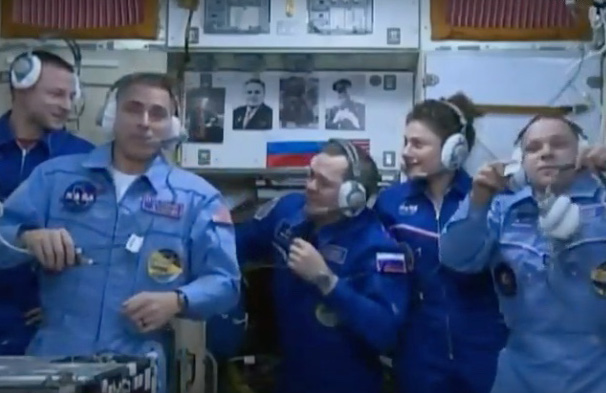The planet that astronaut Jessica Meir sees through the windows of the International Space Station looks as beautiful as ever, but she knows Earth won’t be the same when she returns next week.
After six months on the space station, the Caribou native will come home in the midst of the global coronavirus pandemic, which began well after she entered orbit.
“It’s quite surreal to see this whole situation unfolding on the Earth below,” she said Friday from the space station. “It’s difficult to believe all the changes that have taken place since we’ve been up here.”
Meir, fellow Maine native Chris Cassidy and NASA astronaut Andrew Morgan spoke about space, the pandemic and living in isolation during a news conference from the space station Friday morning. The interview was held a day after Cassidy arrived on the space station for his third space mission. Meir will finish her first six-month stay on the station when she returns to Earth with Morgan on April 17.
Cassidy’s arrival Thursday marked the first time two native Mainers were aboard the space station together.
Meir, a scientist who dreamed since she was young of becoming an astronaut, started the news conference by thanking doctors, nurses and all others working on the front lines of the pandemic for putting their lives on the line to protect others.
“We give our profound and heartfelt thanks to all them,” she said.
Meir said it will be difficult not to hug her family and friends when she returns, but she understands “that is part of the game for a while.”
“I think I will actually feel more isolated on Earth than we do up here,” Meir said.
But Meir said she has heard from friends and family back home about how they have been using technology to deepen their connections with each other, and she encouraged others to do the same. While recognizing the bad side of what is happening, Meir said she is also looking for the positives in stories she has heard of heroes on the frontlines.
“For us, adapting to change and unanticipated obstacles we might encounter is part of our everyday job,” she said. “I think the same now goes as a big challenge for all of those on Earth to try to rise from the other side and take something positive from it.”
Cassidy, who grew up in York, said his mission feels different because he left in the middle of a global crisis and worldwide containment efforts.
His departure for the space station was unlike his past launches because of precautions put in place to protect the crew from exposure to the coronavirus. He spent a month in isolation in Russia, coming into contact with only a few people. His family could not attend the launch and there were no big celebrations or media events leading up to Thursday’s launch.
Cassidy believes those strict precautions have prevented the crew from being exposed to the virus and carrying it to the space station.
“Anything is possible,” he said. “I really think it’s almost a zero percent chance for our crew.”
Despite the changes because of the pandemic, Cassidy said his departure was just as exciting as always.
“I can tell you one thing, no matter how many times you ride on a rocket to space, it never gets old,” he said.
He described the anticipation of getting off a bus, walking into an elevator and riding up to the Soyuz MS-16 spacecraft. The spacecraft performed perfectly and the ride was “amazing,” he said.
During his six-month stay on the station, Cassidy will welcome the first commercial spacecraft carrying NASA astronauts Bob Behnken and Doug Hurley. They will arrive on NASA’s SpaceX Demo-2 flight test in late May or June.
Meir and Cassidy each reflected on what they will miss in the coming months.
For Cassidy, one of the things he misses most is the beaches of his hometown, which he thinks about as he looks out the space station windows.
“I picture that when I’m flying over the country,” he said. “I can picture the coast of Maine, the smell of the seashore and fresh-cut grass.”
Those beaches are now closed to prevent people from congregating and spreading the virus.
Meir – who says she and Cassidy are proud to represent Maine together in space for eight days – will miss “so many things” about space.
“Probably the most is the view out of the cupola or any window here,” she said. “The feeling that gives you as a human is quite difficult to put into words.”
Cassidy and Meir are gearing up for a special event Monday to connect them with students across Maine. They’ll take part in an Earth-to-space call at 1:20 p.m. that will air live on NASA TV and the agency’s website. The event has been coordinated by the Challenger Learning Center of Maine and the Maine Space Grant Consortium.
Send questions/comments to the editors.




Comments are no longer available on this story